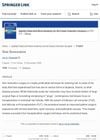 1 citations,
December 2020 in “Acta dermato-venereologica”
1 citations,
December 2020 in “Acta dermato-venereologica” Some scalp sores are linked to different inherited skin conditions.
 August 2023 in “Dermatologic Surgery”
August 2023 in “Dermatologic Surgery” Person-to-person hair transplants can work for patients on lifelong immunosuppression, with high hair growth success.
 December 2020 in “Springer eBooks”
December 2020 in “Springer eBooks” Hair restoration surgery, using modern techniques like FUE and FUT, effectively restores hair with minimal recovery time and high success rate.
 March 2018 in “Journal of Pre-Clinical and Clinical Research”
March 2018 in “Journal of Pre-Clinical and Clinical Research” Skin problems are common in kidney disease, with dry skin and itching in patients not on dialysis or on hemodialysis, and infections most common in transplant recipients.
October 2007 in “Springer eBooks”  March 2023 in “Research Square (Research Square)”
March 2023 in “Research Square (Research Square)” Immune changes and specific genes contribute to male hair loss.
 489 citations,
November 2021 in “Signal Transduction and Targeted Therapy”
489 citations,
November 2021 in “Signal Transduction and Targeted Therapy” The JAK/STAT pathway is important in cell processes and disease, and JAK inhibitors are promising for treating related conditions.
355 citations,
January 2017 in “Journal of the American Academy of Dermatology” JAK inhibitors show promise for treating skin conditions like eczema, hair loss, and psoriasis.
181 citations,
December 2017 in “Trends in immunology” Intestinal intraepithelial lymphocytes are crucial for gut immunity and maintaining the mucosal barrier.
134 citations,
July 2020 in “Experimental dermatology” Hair follicles are normally protected from the immune system, but when this protection fails, it can cause hair loss in alopecia areata.
72 citations,
November 2017 in “Journal of developmental biology” The Hedgehog signaling pathway is important for skin and hair growth and can lead to cancer if it doesn't work right.
51 citations,
December 2017 in “Skin Appendage Disorders” Stress may trigger hair loss by affecting immune protection in hair follicles.
 45 citations,
April 2019 in “International Immunology”
45 citations,
April 2019 in “International Immunology” The study concluded that immune cells attacking hair follicles cause hair loss in alopecia, with genetics and environment also playing a role, and highlighted the potential of certain treatments.
45 citations,
June 2018 in “Frontiers in immunology” MDSC-Exo can treat autoimmune alopecia areata and promote hair regrowth in mice.
40 citations,
October 2012 in “Dermatologic clinics” More research is needed to understand the genetic causes of Alopecia areata to develop better treatments.
33 citations,
January 2018 in “Blood” Ruxolitinib helps protect skin stem cells and keeps skin healthy in mice with skin GVHD.
33 citations,
January 2001 in “Critical care clinics” Dietary lipids affect inflammation and are crucial for normal cell function and immune health.
 32 citations,
April 2017 in “Scientific Reports”
32 citations,
April 2017 in “Scientific Reports” Platelet-rich plasma can help grow more mouse hair follicles, but it doesn't work for human hair follicles yet.
32 citations,
January 2006 in “Liver transplantation” Vitamin A toxicity can cause severe health issues and may require a liver transplant if other treatments fail.
29 citations,
June 2015 in “Kidney International” Disrupting the Flcn gene in mice causes early kidney cysts and tumors, which can be treated with rapamycin.
28 citations,
March 1986 in “The American journal of medicine” Too much vitamin A can cause liver damage and skin issues.
27 citations,
December 2002 in “Journal of dermatological science” Merkel cells and Langerhans cells in hair follicles are closely connected and may interact.
 26 citations,
July 2021 in “Frontiers in Cell and Developmental Biology”
26 citations,
July 2021 in “Frontiers in Cell and Developmental Biology” The review suggests that a special cell-derived treatment shows promise for various skin conditions and hair growth but needs more research for confirmation.
25 citations,
December 2007 in “Developmental biology” Clim proteins are essential for maintaining healthy corneas and hair follicles.
23 citations,
May 2019 in “Stem cell research & therapy” iPSC-derived stem cells on a special membrane can help repair full-thickness skin defects.
22 citations,
December 2013 in “Stem cells and development” Horse skin stem cells combined with platelet-rich plasma improve skin healing.
22 citations,
January 2012 in “Mediators of inflammation” Nonantibiotic macrolides show promise for treating various inflammatory skin conditions.
 19 citations,
January 2017 in “International Journal of Trichology”
19 citations,
January 2017 in “International Journal of Trichology” The document concludes that injecting platelet-rich plasma can effectively treat androgenetic alopecia, a type of hair loss.
19 citations,
January 1990 in “Springer eBooks” 16 citations,
April 2021 in “Frontiers in Cell and Developmental Biology” New hair follicles could be created to treat hair loss.










